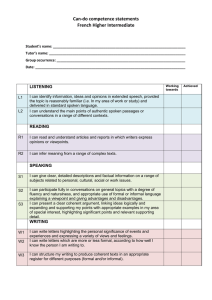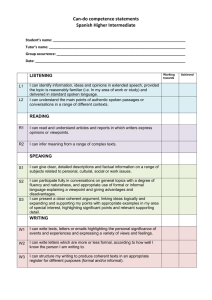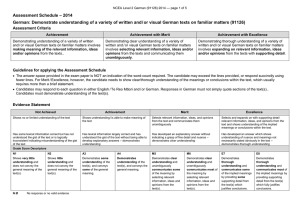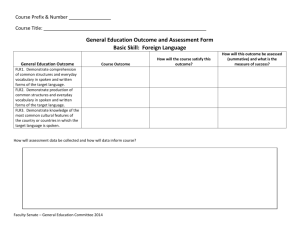– 2014 Assessment Schedule
advertisement
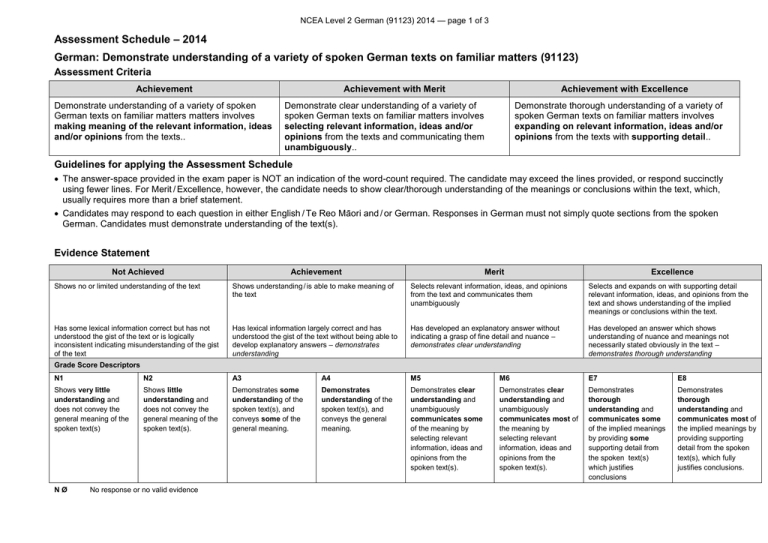
NCEA Level 2 German (91123) 2014 — page 1 of 3 Assessment Schedule – 2014 German: Demonstrate understanding of a variety of spoken German texts on familiar matters (91123) Assessment Criteria Achievement Achievement with Merit Demonstrate understanding of a variety of spoken German texts on familiar matters matters involves making meaning of the relevant information, ideas and/or opinions from the texts.. Achievement with Excellence Demonstrate clear understanding of a variety of spoken German texts on familiar matters involves selecting relevant information, ideas and/or opinions from the texts and communicating them unambiguously.. Demonstrate thorough understanding of a variety of spoken German texts on familiar matters involves expanding on relevant information, ideas and/or opinions from the texts with supporting detail.. Guidelines for applying the Assessment Schedule The answer-space provided in the exam paper is NOT an indication of the word-count required. The candidate may exceed the lines provided, or respond succinctly using fewer lines. For Merit / Excellence, however, the candidate needs to show clear/thorough understanding of the meanings or conclusions within the text, which, usually requires more than a brief statement. Candidates may respond to each question in either English / Te Reo Māori and / or German. Responses in German must not simply quote sections from the spoken German. Candidates must demonstrate understanding of the text(s). Evidence Statement Not Achieved Achievement Merit Excellence Shows no or limited understanding of the text Shows understanding / is able to make meaning of the text Selects relevant information, ideas, and opinions from the text and communicates them unambiguously Selects and expands on with supporting detail relevant information, ideas, and opinions from the text and shows understanding of the implied meanings or conclusions within the text. Has some lexical information correct but has not understood the gist of the text or is logically inconsistent indicating misunderstanding of the gist of the text Has lexical information largely correct and has understood the gist of the text without being able to develop explanatory answers – demonstrates understanding Has developed an explanatory answer without indicating a grasp of fine detail and nuance – demonstrates clear understanding Has developed an answer which shows understanding of nuance and meanings not necessarily stated obviously in the text – demonstrates thorough understanding Grade Score Descriptors N1 N2 A3 A4 M5 M6 E7 E8 Shows very little understanding and does not convey the general meaning of the spoken text(s) Shows little understanding and does not convey the general meaning of the spoken text(s). Demonstrates some understanding of the spoken text(s), and conveys some of the general meaning. Demonstrates understanding of the spoken text(s), and conveys the general meaning. Demonstrates clear understanding and unambiguously communicates some of the meaning by selecting relevant information, ideas and opinions from the spoken text(s). Demonstrates clear understanding and unambiguously communicates most of the meaning by selecting relevant information, ideas and opinions from the spoken text(s). Demonstrates thorough understanding and communicates some of the implied meanings by providing some supporting detail from the spoken text(s) which justifies conclusions Demonstrates thorough understanding and communicates most of the implied meanings by providing supporting detail from the spoken text(s), which fully justifies conclusions. NØ No response or no valid evidence NCEA Level 2 German (91123) 2014 — page 2 of 3 Question One Possible evidence – with indications of responses at Achievement, Merit and Excellence level (not limited to these examples) Assessment judgements are based on the level of understanding shown rather than knowledge of individual lexical items. Note: Answers are judged holistically, not solely on the basis of evidence included in the schedule. What did the four speakers think about their visit to the other part of Germany? Lars: First thing was that the air was very bad, much worse than with us. He got a headache straight away. Everything was grey and lots of broken-down houses Thomas: Couldn’t believe all the shops all the stuff they had and could buy Verena: Everything was free – maybe not everything, but it was free. She could go wherever she wanted and wasn’t checked up on. Swen: Happy when the border fell. 1989 was a year that was the best. Everything was free. The population had open ears and was critical, read the paper and wanted to know things. But that then changed quickly. When the border fell, they didn’t want to know anything anymore. They just wanted to buy coffee and bananas, but that wasn’t what he wanted. Question Two Possible evidence – with indications of responses at Achievement, Merit and Excellence level (not limited to these examples) Assessment judgements are based on the level of understanding shown rather than knowledge of individual lexical items. Note: Answers are judged holistically, not solely on the basis of evidence included in the schedule. According to Meike, what were the positives and negatives of being an au pair girl in the USA, and how would you have found the situation? Base your answer on information from the passage. Get $139 a week. Flights paid for. Free accommodation and food. America land of freedom. Not much time to feel lonely. Could save money and travel afterwards. If you’re lucky, treated like a daughter. Might get lonely. Not allowed to smoke and swear, and no alcohol if under 21. Watch the kids for 45 hours a week when parents go to work. If you had problems, could go to seminar boss. Could improve your English. Have to cook sometimes, but don’t have to clean. NCEA Level 2 German (91123) 2014 — page 3 of 3 Question Three Possible evidence – with indications of responses at Achievement, Merit and Excellence level (not limited to these examples) Assessment judgements are based on the level of understanding shown rather than knowledge of individual lexical items. Note: Answers are judged holistically, not solely on the basis of evidence included in the schedule. Place the number of each speaker on the line to show their opinion, from the most positive about extreme sports to the most negative. 4 3 5 2 Which speaker do you most / least identify with? Why? Refer to as many of their comments as possible. Speaker 1: Thinks it’s terrible, makes him feel very afraid, feels sick when he watches bungee jumping, doesn’t want to risk life, prefers less dangerous sports like handball and such. Speaker 2: Thinks it’s the best thing there is, goes parachuting and thinks it’s super. When you fall, you see your whole life in front of you. In a few moments you experience everything from the last 20 years. It’s crazy. Speaker 3: Not interested. Not afraid but doesn’t understand why he should put himself into such a dangerous position. Wouldn’t do it even if he had the chance. Wouldn’t find it fun. Speaker 4: Doesn’t understand these people, thinks they’re fanatics who don’t know how dangerous it is. They probably don’t love life and don’t have goals like other people. They’re risking their lives, and he thinks it’s stupid. Speaker 5: Never done any but would really like to try it. Of course, really afraid but some things you have to do. Risk that something bad happens to you is OK because bad things can happen to you everywhere. Cut Scores Score range Not Achieved Achievement Achievement with Merit Achievement with Excellence 0–7 8 – 13 14 – 18 19 – 24
